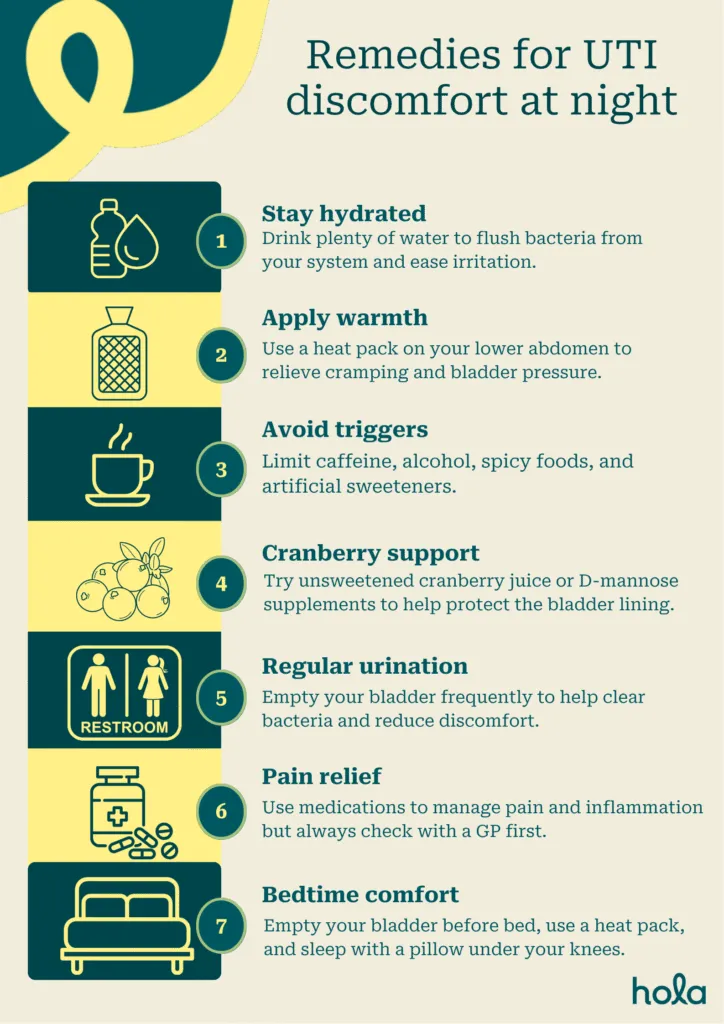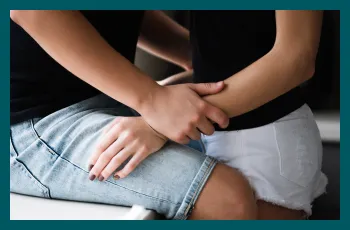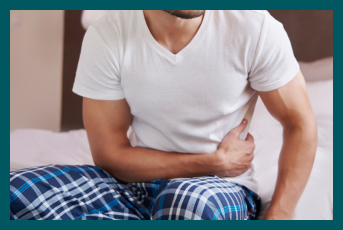How to relieve UTI discomfort: Tips for soothing pain
Written by the editorial staff writer at Hola. Medically Reviewed by Dr. Ammar AL-ANI, MBChB, CCBST, AMC.

Contents

Summary: UTIs can cause significant discomfort, but relief is possible with simple steps like staying hydrated, using a warm compress on your lower abdomen, avoiding bladder irritants, and taking over-the-counter medication. While antibiotics address the infection, these tips can ease discomfort and support faster healing. Pay attention to your body, practise good self-care, and don’t hesitate to online doctors advice.
UTIs-just three letters, but they bring a whole lot of discomfort. If you’ve ever experienced one, you know the drill: frequent bathroom trips, burning sensations, and that irritating pressure in your lower abdomen. It’s unpleasant, and it’s more common than you might think.
In Australia, urinary tract infections account for around 1.2% of all general practice consultations.1 The good news? While antibiotics remain the primary treatment, there are several effective, doctor-approved ways to ease the discomfort and help you bounce back quickly.
What causes UTI discomfort?
UTI discomfort primarily arises from inflammation and irritation of the urinary tract lining due to a bacterial infection, most commonly caused by a bacterium called E. coli. As the bacteria proliferate, they irritate the bladder or urethra, resulting in symptoms such as a burning sensation during urination, a frequent urge to urinate, pelvic pressure, and pain in the lower abdomen. The body’s immune response to the infection also plays a role in this discomfort. In severe cases, if the infection ascends to the kidneys, it can lead to back pain and fever.Feeling sick and unsure why? Speak with a GP online in 15 minutes.
See a Doctor now
Available 24/7, across Australia.
Home remedy to relieve UTI discomfort
Urinary tract infections (UTIs) can produce uncomfortable symptoms like burning, urgency, and pelvic pain. While antibiotics are typically necessary for treatment, various home remedies can help alleviate discomfort and support recovery.- Stay well-hydrated: Consuming a lot of water aids in flushing bacteria out of the urinary tract, which may relieve discomfort and accelerate recovery.
- Apply warmth: Placing a warm heating pad on your lower abdomen can help alleviate bladder pressure and cramps.
- Avoid triggers: Reduce or eliminate caffeine, alcohol, spicy foods, and artificial sweeteners, as these can further irritate the bladder.
- Consider cranberry or D-mannose: Unsweetened cranberry juice or D-mannose supplements may assist in preventing bacteria from adhering to the bladder walls.
- Urinate regularly: Don’t hold in your urine. Regularly urinate to help eliminate bacteria from the urinary tract.
How to ease UTI discomfort during the day
To manage UTI discomfort during the daytime, drink plenty of water to flush out bacteria and remain hydrated. Limit caffeine and acidic drinks, which can aggravate the bladder. Utilise a warm compress on your lower abdomen to ease pressure and cramping. If needed, consider over-the-counter pain relief medications such as panadol or ibuprofen. Unsweetened cranberry juice or D-mannose supplements can be beneficial for urinary health support. Ensure that you urinate frequently without holding it in, as this aids in clearing the infection and decreasing discomfort.How to sleep with UTI discomfort
Sleeping with UTI discomfort can be difficult, but there are a few strategies that may help. Empty your bladder before bed to minimise nighttime urgency. Limit water intake an hour before sleeping to avoid frequent bathroom trips. Use a heat pack on your lower abdomen to soothe pain and pressure. Sleep in a comfortable position, such as lying on your back with a pillow placed under your knees. If the discomfort is significant, taking an over-the-counter pain reliever may help you rest.
When to see a doctor
If your UTI symptoms persist for more than two days, worsen, or are accompanied by fever, chills, back pain, or blood in your urine, you should consult a doctor. Seek medical attention if you experience recurrent UTIs, are expecting a child, have a compromised immune system, or if symptoms appear shortly after treatment. Timely medical care is crucial to avoid the infection advancing to the kidneys or escalating in severity. Always reach out to a doctor if you are uncertain about your symptoms.Can an online doctor consult help?
Yes, consulting with a online doctor can be beneficial for a UTI. You can talk about your symptoms, receive a proper assessment, and, if appropriate, obtain a prescription without needing to visit a clinic. Online doctors can also offer guidance on reducing discomfort, preventing future UTIs, and recognising when in-person care is necessary. It’s a convenient option, particularly for mild or recurring infections; however, if symptoms are severe or do not improve, a physical examination or lab tests may be required.Conclusion:
UTIs aren’t pleasant, but relief is possible. With plenty of water, good self-care, and the right treatment, you will get back to feeling normal quickly. Listen to your body, treat it gently, and consult your doctor when needed. Your urinary system will thank you!FAQs
How long does UTI discomfort last?
UTI discomfort usually starts to improve within 1 to 2 days of starting antibiotic treatment. However, mild symptoms like frequent urges or a little burning sensation may linger for up to a week. If you do not see improvement after 48 hours or if symptoms worsen, be sure to consult your healthcare provider. Early treatment means faster recovery!Can I sleep comfortably with a UTI?
It is not always easy, but comfortable sleep is possible with a UTI. Try to fully empty your bladder before going to bed, stay hydrated during the day (but limit fluids a few hours before sleep), and use a warm compress or a heating pad on your lower abdomen to ease discomfort. Over-the-counter medication may also help you rest more easily. If symptoms are still keeping you awake at night, talk to your doctor; it might be time to adjust your treatment.Does cranberry juice help with UTI pain?
Cranberry won’t cure a UTI or directly relieve the pain, but it may help to stop bacteria from sticking to the lining of the urinary tract. Consider it more of a prevention tool than a remedy. For actual symptom relief, like burning or pelvic pressure, you’ll need to stay well-hydrated, use appropriate pain relievers, and antibiotics if necessary. Ensure you are drinking pure, unsweetened cranberry juice, as sugar-loaded versions aren’t helpful. Get your prescription online within
15 minutes, anytime, anywhere.
15 minutes, anytime, anywhere.
Request an instant script
Available 24/7, across Australia.
What we treat
- Cough
- Nausea & vomiting
- Fever
- Hayfever
- Fatigue
- Sore throat
- Acne
- Hair loss
- Gout
- Eczema
- Rosacea
- Sunburn
- UTI
- Erectile dysfunction
- Contraception
- Morning sickness
- Morning after pill
- Prostate health
- Anxiety
- Depression
- Stress
- Grief & loss
- Antidepressants
- Premature ejaculation
- Asthma
- Blood pressure
- Blood thinners
- Diabetes
- Cholesterol
- Migraines & headaches
- Allergies
- Body ache
- Heartburn & reflux
- Sleep disorder
- Pain relief
- Gastro
Related Articles
Disclaimer
This blog is for general informational purposes only and does not indicate that Hola Health provides all treatments or preventive measures mentioned. It is not intended to be a substitute for professional medical advice. Always seek the guidance of your doctor or other qualified health professional with any questions you may have regarding your health or a medical condition. For emergencies please immediately contact 000. Any medical topics discussed are intended to educate, not to imply availability through Hola Health.
 Facebook
Facebook  X
X  Copy Link
Copy Link



